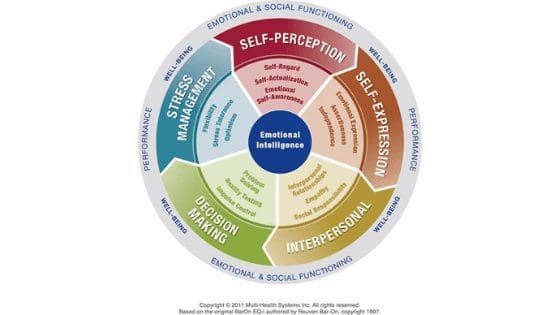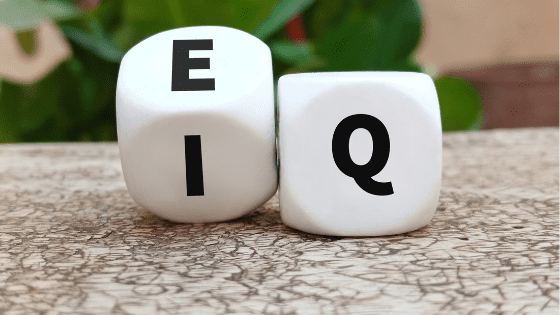Have you ever seen an individual handle an awkward work situation with finesse? Or perhaps you have a colleague who never stresses over an impending deadline? Well, if you have ever scratched your head and wondered how they do it, it’s because they have an abundance of a particular skill – emotional intelligence.
When you have higher levels of emotional intelligence, you possess the ability to understand yourself better and those around you and apply what you learn for more significant results.
Emotional intelligence is invaluable if you want to get ahead in your career and life. Keep reading to discover what emotional intelligence is, how it’s measured, and the benefits of high emotional intelligence.
What is emotional intelligence?
In essence, emotional intelligence is the ability to recognise, understand and regulate our emotions rather than allow them to manage us. We can then ensure our actions are more conscious. It also helps reduce unintentional communication through body language, tone of voice and facial expressions.
Emotional intelligence enables you to have a higher level of social awareness, understanding how your responses impact those around you while also being able to understand and respond appropriately to the emotions of individuals around you.

Why is emotional intelligence important?
Emotional intelligence plays an enormous part in our day-to-day lives, so it’s no surprise that individuals and organisations are focusing on the crucial role of emotional intelligence in the workplace.
As human beings, we are sociable creatures by nature and wired to make connections. So, the more we learn, cultivate positive relationships and develop supportive connections, the more our lives can become enriched, ultimately increasing our happiness. In fact, research shows a correlation between higher levels of emotional intelligence and happiness.
Increased emotional intelligence benefits you as an individual and those you encounter daily, creating a positive ripple effect.
The benefits of emotional intelligence
Increased self-awareness
Emotionally intelligent people are more self-aware. They are aware of their emotions and behaviours. This enables them to take steps to modify their responses and achieve more significant results in terms of their own well-being and when communicating with others. They are much less likely to communicate unintentionally through their facial expressions, tone of voice or general body language.
Thinking before you react
Because those with a high degree of emotional intelligence recognise their triggers, they are more in control of their emotions and how they act. They respond less impulsively and take time to think before they react, even when they experience highly charged emotions. For example, suppose they become angry due to the actions of a colleague instead of responding immediately, typically in an aggressive manner. In that case, they may take a moment to breathe before responding and then doing so in a much calmer, measured and logical way, helping to prevent the situation from escalating.

Improved communication
Emotionally intelligent people communicate more intentionally and are more aware of other people’s communication. They have greater listening skills and can detect changes in other people’s tone and body language that may provide greater insight. However, emotionally intelligent people refrain from passing judgement and will use good questioning techniques to ensure a greater understanding of a situation.
Empathy for others
Empathy is a significant part of emotional intelligence. Understanding and having compassion for other people’s feelings further aids communication and building relationships.
Increased resilience
Emotionally intelligent people are much more open to criticism and respond well when it is received. This leads to others feeling more comfortable in giving feedback, providing a plethora of opportunities to develop as an individual.
They take responsibility for their mistakes, learn from them and move on, rather than dwelling on issues unnecessarily.
Stronger relationships
Emotionally intelligent people can share their feelings without becoming highly emotive, enabling them to share their points of view calmly. This increases the likelihood of other parties being receptive to understanding your position and feeling comfortable sharing their own perspective, in the same manner, building stronger workplace and personal relationships.

Emotional intelligence in the workplace
When it comes to the workplace, a greater degree of emotional intelligence can help us:
1. Resolve workplace conflicts
Conflict is an inevitable occurrence in the workplace. Typically, conflicts arise when people have differing opinions and perspectives. Conflicts can also occur due to miscommunication or where employees are unclear about what is expected of them. When conflict arises, it can often be exacerbated due to our stress response being triggered, resulting in a “fight” or “flight” response. We often act impulsively instead of logically.
However, we can call on our emotional intelligence to deal with the issue more productively. As emotional intelligence affects how we manage our own behaviour, we can be more aware of any unintentional signals we may be giving off, remain calm, focus more on the facts and view the situation from the other person’s eyes and understand their perspective without judgment. This is much more likely to lead to a less emotional discussion, objectively examining an array of potential solutions.
2. Train and motivate others
When leaders understand emotional intelligence and how to develop it, they are in a much stronger position to help their team develop the same skills. When leaders also lead by example and demonstrate high emotional intelligence, employees see the benefits for themselves, increasing their motivation and desire to develop and maintain strong interpersonal relationships with their colleagues. This ultimately motivates other employees, who then go on to train and develop each other.
3. Create a positive and collaborative culture
By having higher levels of emotional intelligence across the organisation, employees recognise the contributions made by others and give credit where it is due, further increasing motivation and strong working relationships.
Teams work together more collaboratively, with more effective communication and a shared sense of empathy, to develop a greater sense of unified purpose.
While you can’t force emotional intelligence on a team, you can foster its development by creating the right conditions.

Emotional intelligence models
There are three main models of emotional intelligence: Daniel Goleman’s performance model, Bar-On’s competencies model, and Mayer, Salovey, and Caruso’s ability model. All the emotional intelligence models are very popular and used every single day across the world. However, Daniel Goleman’s emotional intelligence theory is probably the most well-known.
Daniel Goleman’s theory of emotional intelligence
Daniel Goleman’s theory states that emotional intelligence comprises five key components, with a wide variety of skills and abilities that can be improved. It focuses on three capabilities; Self-awareness, relationship management, and social awareness, which, Goleman states, form the starting point of twelve “subscales” of emotional intelligence, which can be seen in the image above.
Knowing the skills and subscales that make up our emotional intelligence can be beneficial, of course, but how do we know when it needs improvement. The short answer – is to use the Emotional Quotient Inventory.
The Emotional Quotient Inventory (EQ-i 2.0)
The EQ-i 2.0 model, also known as the Emotional Quotient Inventory, is a professional tool that measures emotional intelligence. So, applying years of research to the assessment can help support human development and performance by detailing your areas of strength and any areas that could be developed.
With the comprehensive EQ-i 2.0 report, you will see how your emotional intelligence competencies work together while getting suggestions of strategies you could use to strengthen your capabilities.
The report will look into skills such as;
- Stress management (Flexibility, stress tolerance, optimism)
- Self-perception (Self-regard, self-actualisation, emotional self-awareness)
- Self-expression (Emotional expression, assertiveness, Independence)
- Interpersonal (Empathy, social responsibility, interpersonal relationships)
- Decision-making (Problem-solving, reality testing, impulse control).

How emotional intelligence is measured
Several tools are available to assess your emotional intelligence, including the EQ-i 2.0, and they usually fall into one of two categories: self-reporting assessment and ability tests.
Self-reporting assessments (or questionnaires) are the most common because they are the easiest to administer and score. Respondents read a series of statements, “I often feel that I understand how others are feeling,” and confirm to what level they agree or disagree with each of the comments (strongly agree, somewhat disagree, neutral, disagree, or strongly agree). On completion of the questionnaire, a bespoke report is produced showing their level of emotional intelligence and how they score in each area or subscale.
Although self-reporting assessments are easier to administer and score, they have their pitfalls. They rely on a level of self-awareness of the respondent and a willingness to be completely open and honest (being vulnerable).
On the other hand, ability tests are rated by a third party. They typically involve people responding to scenarios while their skills are assessed. However, the results can be influenced by several factors, including how the individual responds at a particular time, which could have more to do with the pressure they feel when being tested, as opposed to a true reflection of their skills and abilities.
With the EQ-i 2.0 model, emotional intelligence and leadership can be developed through an emotional intelligence assessment. This assessment is a self-reporting questionnaire, producing a detailed report of the areas your strength lies and any areas that potentially need to be developed further. However, respondents have an opportunity to incorporate 360-degree feedback from colleagues who encounter the respondent daily and observe them demonstrating (or not) the relevant skills in the workplace.
If you’re interested in completing this assessment or having your team do so, get in touch to arrange an initial call to discuss your requirements.

Emotional intelligence is a skill
If emotional intelligence is crucial for a successful career and greater happiness, is it a skill you can develop, or is it something you are born with? The good news is that emotional intelligence is a skill, and like any other, it can be taught or developed, and all it takes is time and patience.
Some people will have a greater skill level in some subscales of emotional intelligence than others. Therefore, using an assessment tool can help to identify areas that you may wish to focus on first, rather than risking overwhelms and trying to tackle all subscales.
Even if you consider yourself to be someone with a high level of emotional intelligence, you may want to evaluate how your score in each of the areas. As with any strength, if in overdrive, each of the emotional intelligence subscales can become a weakness. For example, people with a very high level of tolerance to stress can be a fantastic asset under pressure. However, to others, they may appear as not caring about their work or be empathetic to those who aren’t as tolerant.
How to develop your emotional intelligence
If you want to enhance your emotional intelligence and leadership skills simultaneously, then it is entirely possible! Here are a few steps you can take:
Take an assessment
Undergoing some form of emotional intelligence assessment is a great and efficient way of benchmarking your current level of emotional intelligence and identifying one to three areas you want to focus on.
Observe your own emotions and behaviour
Consciously observing what triggers your emotions, when and how you respond, and how others respond to you can provide a high level of insight. You might do this at the moment or spend some time each week reflecting back and considering specific events that have occurred.
Seek feedback
Seeking feedback from others can feel uncomfortable but can be extremely useful, particularly for shining a light on our ‘blind spots’.
Ask questions and listen more
To understand other people better, the first step is to take the time to talk to people, find out more about them and actively listen to what they have to say – both verbally and non-verbally.
If you are struggling to think of how you can develop your emotional intelligence skills yourself, then Delphinium can help you. Book your free discovery call to discuss our emotional intelligence assessments and training for leaders.
Published 19th July 2022.




